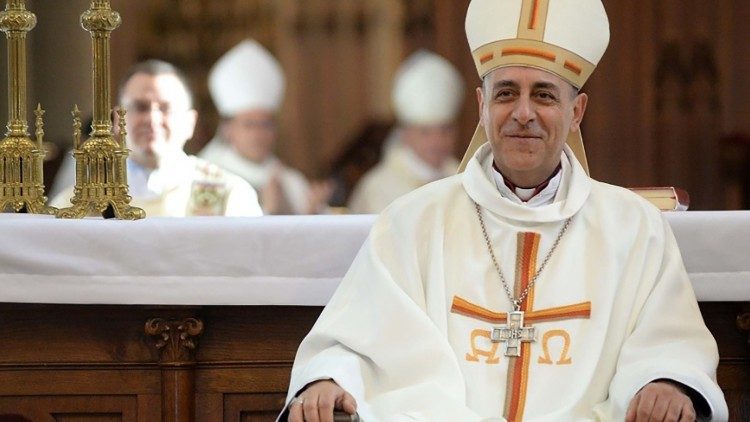Vatican press release clarifies that blessing is not approval of homosexual unions
The Dicastery for the Doctrine of the Faith speaks out following reactions by some episcopal conferences to the Declaration Fiducia Supplicans, noting that it requires “discernment in loco,” reflecting local situations, not ideological bias. Where homosexuality is an offence, the Church should promote “training, the defense of human dignity, [and] the teaching of the Social Doctrine of the Church”.
Vatican City (AsiaNews) – After the reactions of some Bishops' Conferences, the Dicastery for the Doctrine of the Faith released a statement today, published by the Vatican Press Office, on the Declaration Fiducia Supplicans, made public on 18 December with the approval of Pope Francis, which opens up the possibility of "pastoral blessings" for homosexual or other couples in "irregular" situations with respect to the doctrine of the Church.
The statement – signed by the prefect, Card Victor Manuel Fernandez and the secretary, Mgr Armando Matteo – explains that “The understandable statements of some Episcopal Conferences regarding the declaration Fiducia Supplicans have the value of highlighting the need for a more extended period of pastoral reflection.”
The Dicastery for the Doctrine of the Faith reiterates that “This Declaration remains firm on the traditional doctrine of the Church about marriage, not allowing any type of liturgical rite or blessing similar to a liturgical rite that can create confusion.”
But in view of the aspect that has most raised discussion, i.e. the possible blessings of irregular couples, the Dicastery recognises that it is up to local bishops to identify when and how to accept the indication contained in the Declaration Fiducia Supplicans.
“Some Bishops, for example, have established that each priest must carry out the work of discernment and that he may, however, perform these blessings only in private,” reads the statement.
“None of this is problematic if it is expressed with due respect for a text signed and approved by the Supreme Pontiff himself, while attempting in some way to accommodate the reflection contained in it.”
“Prudence and attention to the ecclesial context and to the local culture could allow for different methods of application, but not a total or definitive denial of this path that is proposed to priests.”
What is more, “If there are laws that condemn the mere act of declaring oneself as a homosexual with prison and in some cases with torture and even death, it goes without saying that a blessing would be imprudent. It is clear that the Bishops do not wish to expose homosexual persons to violence,” stresses the Dicastery.
“It remains vital that these Episcopal Conferences do not support a doctrine different from that of the Declaration signed by the Pope, given that it is perennial doctrine, but rather that they recommend the need for study and discernment so as to act with pastoral prudence in such a context.
“In truth, there are not a few countries that, to varying degrees, condemn, prohibit and criminalize homosexuality. In these cases, apart from the question of blessings, there exists a great and wide-ranging pastoral responsibility that includes training, the defense of human dignity, the teaching of the Social Doctrine of the Church and various strategies that do not admit of a rushed response.”
The Dicastery’s statement aims above all to stress that the real novelty of the Declaration is not the possibility of blessing irregular couples, but in having “a broader understanding of blessings and of the proposal that these pastoral blessings, which do not require the same conditions as blessings in a liturgical or ritual context, flourish. Consequently, leaving polemics aside, the text requires an effort to reflect serenely, with the heart of shepherds, free from all ideology.
“Although some Bishops consider it prudent not to impart these blessings for the moment, we all need to grow equally in the conviction that: non-ritualized blessings are not a consecration of the person nor of the couple who receives them, they are not a justification of all their actions, and they are not an endorsement of the life that they lead.
“When the Pope asked us to grow in a broader understanding of pastoral blessings, he proposed that we think of a way of blessing that does not require the placing of so many conditions to carry out this simple gesture of pastoral closeness, which is a means of promoting openness to God in the midst of the most diverse circumstances.”
For the Dicastery, “in giving a blessing to two people who come together to ask for it spontaneously, we are not consecrating them nor are we congratulating them nor indeed are we approving that type of union.
“In reality the same happens when individuals are blessed, as the individual who asks for a blessing – not absolution – could be a great sinner, but this does not mean we deny him this paternal gesture in the midst of his struggle to survive.
“If this is clarified as a result of good catechesis, we can free ourselves from the fear that these blessings of ours may express something inadequate. We can be freer and perhaps closer and more fruitful ministers, with a ministry that is full of gestures of fatherhood and hospitality, without fear of being misunderstood.”
30/12/2023 14:52
17/05/2024 19:46







.png)










